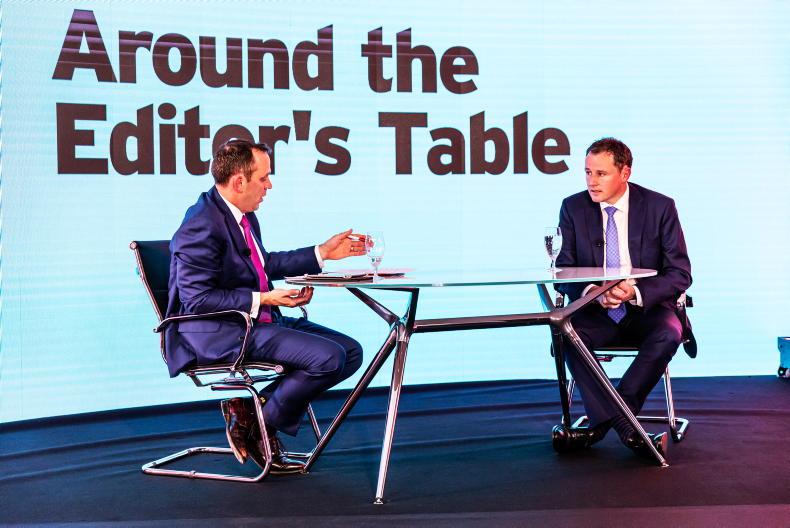Minster for Agriculture Charlie McConalogue has led a charmed life during his first year in office. He managed to time his run perfectly on CAP. The outcome of this reform was largely determined in Brussels prior to his appointment. This has allowed him spend the last year in consultative mode without having to take responsibility for the outcome and – more importantly – without having to make unpopular policy decisions.
It has been similar with climate change, with the ongoing deliberations of the Climate Change Advisory Council (CCAC) on setting national emissions targets again buying the minister time before having to make the tough decisions in relation to emission reductions in agriculture.
Added to this, he has been blessed with a period of relatively strong prices across all the main commodities, while at the same time farmers have enjoyed favourable weather conditions for grass growth and harvesting.
However, there is no doubt that the good times are coming to an end for the minister. At farm level, he could quickly find himself facing head-on into an income crisis with the price of inputs surging. With Adam Woods reporting a breakeven beef price of €5/kg required next spring, winter finishers could be top of the queue.
Budget 2022 will show if the minister and his Department continue to control the direction of agricultural policy
But the first big test will come within a matter of days. The outcome of Budget 2022 will show what level of influence the minister has around the Cabinet table and his ability to represent the interests of the sector. But perhaps even more importantly, it will show the extent to which he and his Department continue to control the direction of agricultural policy.
There is widespread concern that ground has been lost in this regard to the Department of the Environment and Minister Eamon Ryan. The recent classification of the tax differential between road diesel and green diesel as a fossil fuel subsidy by both the CSO and the tax strategy group within the Department of Finance exposes the shift that is taking place. As Colm McCarthy reports in this week's edition, it should be of major concern to farmers and farm organisations given the financial implications.
The approach is flawed on the basis that the higher tax on road diesel includes a charge for the provision and maintenance of the road network. The vast bulk of fuel burned through tractors is used inside the farm gate. Nevertheless, the move to classify the differential as a fossil fuel subsidy creates the platform for a campaign to seek to have it removed.

Justin McCarthy interviewing Minister McConalogue. \ Philip Doyle
Farmers will also be watching Budget 2022 closely with respect to securing a commitment from Government to provide the same level of co-financing for farm schemes under the Rural Development Programme (RDP). But in a budget that is expected to deliver a €4.5bn spending increase, attention will also focus on the commitment of Government to introduce innovative supports that will help the sector to reduce its environmental footprint.
Minister McConalogue has a strong hand to play here. As highlighted previously, Irish farmers have been almost totally excluded from accessing increased funding at EU level to support the sector in its green transition. This was due to the fact that the presence of Google and Facebook, along with other multinationals, grossly inflates Ireland’s GDP per capita – the mechanism used, for the first time, to allocate funding under the EU €750bn recovery and stimulus fund.
As a result, Ireland received one of the lowest levels of funding per capita in the EU. It would not be tenable for the Government to leave farmers, 43% of whom earn less than €10,000 per annum, exposed to this shortfall. Budget 2022 offers the opportunity to correct this through increased Exchequer supports.
Farm organisations
Reviewing the pre-budget submissions by farming organisations, the main asks tend to be a rinse and repeat of what has been asked for over a number of years – more or less higher spending for existing schemes. Farm organisations need to come forward with new initiatives/schemes that deliver on the Government’s environmental agenda while at the same time delivering for farmers – the straw incorporation scheme being an example of where this has worked.
As far back as 2013, we highlighted the potential for a slaughter premium based on age to be introduced. This would help support the low-income beef sector while also incentivising farmers to reduce the average age at slaughter and in doing so reduce agricultural emissions, therefore delivering a win for farmers and Government. Such a scheme would appear to make even more sense today.
Looking beyond the budget, there will be no respite for the minister. Attention will quickly turn to climate change and the setting of sectoral emission targets. This will not only present a defining moment for the minister but for Irish farming. Minister McConalogue has spent his first year in office talking the talk. Now we’ll see if he can walk the walk.
Minster for Agriculture Charlie McConalogue has led a charmed life during his first year in office. He managed to time his run perfectly on CAP. The outcome of this reform was largely determined in Brussels prior to his appointment. This has allowed him spend the last year in consultative mode without having to take responsibility for the outcome and – more importantly – without having to make unpopular policy decisions.
It has been similar with climate change, with the ongoing deliberations of the Climate Change Advisory Council (CCAC) on setting national emissions targets again buying the minister time before having to make the tough decisions in relation to emission reductions in agriculture.
Added to this, he has been blessed with a period of relatively strong prices across all the main commodities, while at the same time farmers have enjoyed favourable weather conditions for grass growth and harvesting.
However, there is no doubt that the good times are coming to an end for the minister. At farm level, he could quickly find himself facing head-on into an income crisis with the price of inputs surging. With Adam Woods reporting a breakeven beef price of €5/kg required next spring, winter finishers could be top of the queue.
Budget 2022 will show if the minister and his Department continue to control the direction of agricultural policy
But the first big test will come within a matter of days. The outcome of Budget 2022 will show what level of influence the minister has around the Cabinet table and his ability to represent the interests of the sector. But perhaps even more importantly, it will show the extent to which he and his Department continue to control the direction of agricultural policy.
There is widespread concern that ground has been lost in this regard to the Department of the Environment and Minister Eamon Ryan. The recent classification of the tax differential between road diesel and green diesel as a fossil fuel subsidy by both the CSO and the tax strategy group within the Department of Finance exposes the shift that is taking place. As Colm McCarthy reports in this week's edition, it should be of major concern to farmers and farm organisations given the financial implications.
The approach is flawed on the basis that the higher tax on road diesel includes a charge for the provision and maintenance of the road network. The vast bulk of fuel burned through tractors is used inside the farm gate. Nevertheless, the move to classify the differential as a fossil fuel subsidy creates the platform for a campaign to seek to have it removed.

Justin McCarthy interviewing Minister McConalogue. \ Philip Doyle
Farmers will also be watching Budget 2022 closely with respect to securing a commitment from Government to provide the same level of co-financing for farm schemes under the Rural Development Programme (RDP). But in a budget that is expected to deliver a €4.5bn spending increase, attention will also focus on the commitment of Government to introduce innovative supports that will help the sector to reduce its environmental footprint.
Minister McConalogue has a strong hand to play here. As highlighted previously, Irish farmers have been almost totally excluded from accessing increased funding at EU level to support the sector in its green transition. This was due to the fact that the presence of Google and Facebook, along with other multinationals, grossly inflates Ireland’s GDP per capita – the mechanism used, for the first time, to allocate funding under the EU €750bn recovery and stimulus fund.
As a result, Ireland received one of the lowest levels of funding per capita in the EU. It would not be tenable for the Government to leave farmers, 43% of whom earn less than €10,000 per annum, exposed to this shortfall. Budget 2022 offers the opportunity to correct this through increased Exchequer supports.
Farm organisations
Reviewing the pre-budget submissions by farming organisations, the main asks tend to be a rinse and repeat of what has been asked for over a number of years – more or less higher spending for existing schemes. Farm organisations need to come forward with new initiatives/schemes that deliver on the Government’s environmental agenda while at the same time delivering for farmers – the straw incorporation scheme being an example of where this has worked.
As far back as 2013, we highlighted the potential for a slaughter premium based on age to be introduced. This would help support the low-income beef sector while also incentivising farmers to reduce the average age at slaughter and in doing so reduce agricultural emissions, therefore delivering a win for farmers and Government. Such a scheme would appear to make even more sense today.
Looking beyond the budget, there will be no respite for the minister. Attention will quickly turn to climate change and the setting of sectoral emission targets. This will not only present a defining moment for the minister but for Irish farming. Minister McConalogue has spent his first year in office talking the talk. Now we’ll see if he can walk the walk.







 This is a subscriber-only article
This is a subscriber-only article









SHARING OPTIONS: